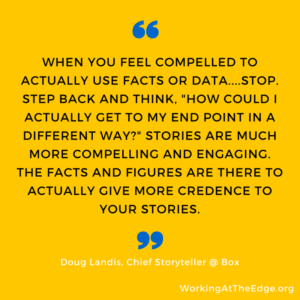 I enjoy listening to podcasts and often discover nuggets of information that I connect to my practice as a school leader. Recently I was listening to an episode of The Growth Show where Doug Landis, Chief Storyteller at Box was being interviewed. In the conversation he shared this which prompted me to think about the relationship between leadership and storytelling:
I enjoy listening to podcasts and often discover nuggets of information that I connect to my practice as a school leader. Recently I was listening to an episode of The Growth Show where Doug Landis, Chief Storyteller at Box was being interviewed. In the conversation he shared this which prompted me to think about the relationship between leadership and storytelling:
When you feel compelled to actually use facts or data….stop. Step back and think, “How could I actually get to my end point in a different way?” Stories are much more compelling and engaging. The facts and figures are there to actually give more credence to your stories.
The leaders and thought leaders I admire most are those who weave stories – actual examples from practice – into their communication, whether speaking, blogging, podcasting – whatever the medium. As an example of this, I have become very interested in the learner-centered paradigm (as opposed to school-centered paradigm). Education Reimagined and their bi-weekly newsletter Pioneering regularly push out their own stories and the stories of other educators designing, leading and thriving in the learner-centered paradigm. Telling me stories from practice is far more compelling than technical writings and definitions alone. Stories before facts and data. And because they tell stories, I hold Education Reimagined and the people they spotlight as experts in the field I can grow from.
Education Reimagined is an example of how we can lead with stories. But are their non-examples. Sadly, I think there are plenty in the field of education, both online and offline. I wonder how the use of stories becomes a means to evaluate the expertise and authenticity of those we interact with both online and offline and who we identify as thought-leaders. Is that speaker or blogger sharing an opinion based on facts or data culled from what others are thinking – from reading about the stories of others? Or does that speaker or blogger add value to the conversation by leading with a personal story supported by facts, data and opinion? The difference is subtle, and I think the lens of story might help us become better consumers of information. If we expect this kind of thinking and evidence behind opinion from our students, should we be expecting it from ourselves as adults and educational leaders?
Don’t just tell me your opinion. Don’t just give me a bulleted list of what you think I ought to do. Engage me with a story, preferably your own, that leads me to think differently and understand what personal experiences have brought you to a particular opinion or understanding. Leaders that lead with their own stories will the most credibility.
Later this spring, my colleague, Lynn Fuini-Hetten, and I will be collaborating with Education Reimagined to tell stories focused on leadership and learner-centered environments. We are excited about this collaboration and look forward to sharing more in the near future!
How do your favorite leaders/thought leaders lead with story?
Connect with Randy on Twitter and on the TLTalkRadio podcast!
Get new content delivered to your inbox and the ebook 3 Key Principles of Digital Transformation. The ebook contains valuable information from my experience leading a digital transformation and working with a variety of stakeholders over the past decade.
- A silver lining - January 22, 2022
- Is our use of tech working against us? 🤔 - September 8, 2021
- What’s NOT going to change in the next 10 years? 🤔 - September 7, 2021